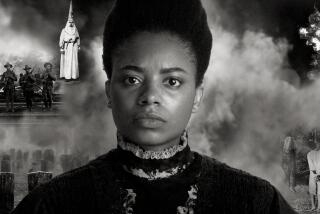Festival Hong Kong at the Nuart Lists 14 Films
- Share via
The two-week Festival Hong Kong beginning today at the Nuart presents 14 films. They attest to the bravura and diversity of one of the world’s liveliest film industries, still little-known outside Chinatown theaters and facing a decidedly uncertain future once China regains control of the Crown Colony in 1997. Jackie Chan, the mischievous martial artist supreme, is well-represented in the series, and there will be films directed by zesty period specialist Tsui Hark and action virtuoso John Woo. Each program will be a double feature playing two nights only.
Launching the festival today are Ching Siu Tung’s’ “A Chinese Ghost Story” (1987) and Hark’s “Peking Opera Blues” (1986). The first is at once a highly commercial genre film and a pure enchantment in which a dazzling mastery of technique has been brought to bear upon the telling of a quaint fable.
When a naive young tax collector (Leslie Chung) takes shelter in a haunted temple, he falls in love with a beautiful ghost (Wong Tsu Hsien) held in the thrall of a 1,000-year-old tree monster whose human form seems to be that of an aging drag queen. Coming to the couple’s aid is a scruffy, philosophical swordsman (Wo Ma). Filmed in ravishing color, “A Chinese Ghost Story” moves like lightning and is crammed with action involving the most spectacular special effects and martial arts displays.
“Peking Opera Blues,” a lush period piece, is one of the most justly celebrated Hong Kong movies of recent years. It’s a kind of breathless Feydeau farce mixed with knockabout action and political satire involving the adventures of three young women in 1912, a year of backlash and corruption in the wake of revolution.
The women are a dippy bankrupt warlord’s concubine (Cherie Chung) in search of an elusive box of jewels, a general’s daughter (Brigitte Lin) who loves her father but secretly supports the revolution and, most important, the daughter (Sally Yeh) of the proprietor of an opera who dares to dream that she can break into the acting ranks of her father’s traditional all-male opera.
“Project A--Part II” and “Armour of God II” (Friday and Saturday) compose a terrific Jackie Chan double feature. The first finds Jackie a Coast Guard officer turned cop dedicated to mopping up underworld corruption, and the second, which Chan also wrote and directed, is a martial arts variation on “Raiders of the Lost Ark” with Jackie in search of Nazi gold in the heart of the Sahara Desert.
The impish, good-natured Chan is as skilled a comedian with an engagingly unpretentious personality as he is an acrobatic martial artist--and clearly, too, a talented writer and director. (Note: Hong Kong sequels are self-contained; you need not have seen the first “Project A” and “Armour of God” to enjoy their second installments.)
In the ‘20s and ‘30s Shanghai supported a venturesome, often daringly leftist cinema, and one of its top stars was the ill-fated Ruan Ling-yu, who was also one of the greatest actresses ever to face a camera, a woman who combined the delicacy of Gish with the sensuality of Garbo. Stanley Kwan’s “The Actress” (Sunday and Monday) is a remarkably perceptive film biography of Ruan Ling-yu, who is played beautifully by Maggie Cheung.
Accompanying “The Actress” is Huang Yu-Shan Huang’s sensitive, stylized “Twin Bracelets” (1992), which tells of the coming of age of a young lesbian in a small Chinese village. This is a strong, deftly wrought feminist protest against the cruelty of arranged marriages and all the other customs that have oppressed Chinese women from antiquity to the present. Information: (310) 478-6379.
Note: LACMA’s “By Popular Demand” film series will present in Bing Theater Friday at 1 p.m. and 8 p.m. John Huston’s “The Misfits” (1961) and “The Breaking Point” (1950), directed by Michael Curtiz and starring John Garfield and Patricia Neal. Howard Hawks’ “Red River” (1948) and Michael Curtiz’s “The Sea Wolf” (1941), with Garfield and Edward G. Robinson, screen Saturday at 8 p.m.
Information: (213) 857-6010.
More to Read
Only good movies
Get the Indie Focus newsletter, Mark Olsen's weekly guide to the world of cinema.
You may occasionally receive promotional content from the Los Angeles Times.










